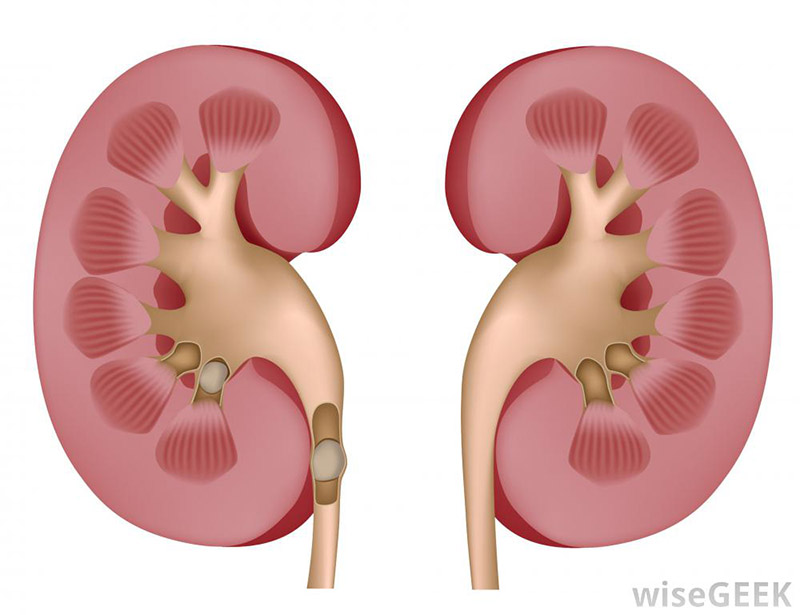
While most kidney stones will pass on their own accord, larger stones some will require surgery, especially if there is a threat of kidney damage. Here’s an overview of kidney stones.
The kidneys are vital organs that filter water and other waste products from your blood, produce urine and hormones, and maintain levels of minerals in your bloodstream. They are small and bean-shaped, and are located in the upper back of the abdomen.
What Are Kidney Stones?
Kidney stones are hard, solid crystals of various sizes formed from the salts in urine. They can cause pain and infection, and blockages that may result in kidney damage or failure and other complications in the urinary tract.
Roughly 1 in 20 people will experience kidney stones in their life, and they are more prevalent in men. Some kidney stones are quite small and will pass on their own accord, but larger stones some will require surgery if they are too large to pass. If there is blockage from a stone as well as infection then surgery is also needed.
There are four main types of kidney stones:
• Those formed from calcium combined with oxalate or phosphate (these are the most common).
• Struvite stones, which are caused by a urine infection and magnesium and ammonia.
• Uric acid stones, which caused by too much acid in the urine. These can be sharp and quite large.
• Cystine stones, which are quite uncommon. They are hereditary and are more crystalline than other stones.
Causes of Kidney Stones
Kidney stones are caused by high levels of calcium, oxalate, cystine or uric acid in the urine. Some medical conditions may result in levels of these substances increasing. Most of the time no blood or urine problems is identified and the levels of calcium, oxalate, cystine or uric acid are normal. It is thought that the most common cause is chronic dehydration.
Symptoms of Kidney Stones
Symptoms of kidney stones include:
• A stabbing pain in the lower back, just below the ribs. This can be quite severe
• Small stones in the urine (often caused by uric acid stones)
• An urgent need to urinate
• Shivers, sweating and fever, cloudy or bad smelling urine – if there is a urinary infection

Treatments
As long as there is no infection, stones less than 5mm in size can be treated non surgically. If the pain is manageable the stone may pass in 4-6 weeks. Some patients may not wish to try and pass the stone and hence it can be removed surgically.
If the stone is too large or the patient wishes to have treatment then surgery can be performed. If there is infection then the kidney is unblocked surgically by insertion of a drainage tube and the stone is treated once the infection settles.
Ureteroscopy
During a ureteroscopy no incisions need to be made, rather, the ureteroscope is inserted into the urethra then is passed through the bladder and into the ureter. Sterile fluid is used to visualise the ureter and kidney.
Kidney stones in the ureter may be removed using forceps or a “basket” that is attached to the channels on the ureteroscope. Smaller stones can be removed in one piece, but larger ones may need to be broken down into smaller pieces before they can be taken out.
Dr Arianayagam routinely uses a laser to break stones. Some stones are fragmented into dust while others are broken into pieces and then removed with a basket.
Percutaneous Nephrolithotomy
Percutaneous nephrolithotomy may be performed if the stone is very large or even fills the whole kidney (Staghorn calculus). This involves puncturing the kidney from the outside and inserting a special camera into the kidney from the back. The stone is then broken and removed with a combination of ultrasound, laser and suction. It is far less invasive than open surgery.
Extracorporeal Shock Wave Lithotripsy
ESWL is the least invasive surgical kidney stone treatment. It employs high frequency sound waves from an external source to break the stones into smaller pieces. They then pass through the urine. ESWL was the main treatment used for stones in the kidney until the advent of laser. Currently most stones are broken with a laser rather than shock wave lithotripsy.
Treating Kidney Stones with Urology Specialist
While he is primarily a urological cancer surgeon, Dr Arianayagam also sees patients with general urological problems, including stones in the kidneys, ureters or bladder. He is happy to help anyone with kidney stones urgently as he is aware of how much pain stones can cause.
Please call Dr Arianayagam’s office on 1300 307 990 and his staff will be able to assist. A direct admission can be arranged and surgery planned for as quickly as needed.

